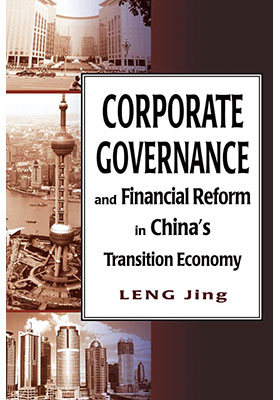Corporate Governance and Financial Reform in China’s Transition Economy
(中國轉型經濟中的公司管治與金融改革)
ISBN : 978-962-209-931-9
June 2009
320 pages, 6″ x 9″
Ebooks
The world economy is facing unprecedented challenges brought by the still unfolding global financial crisis. At this critical juncture in history, China’s economic performance and financial stability are closely watched across the world. The current global economic downturn and the rigidities it poses on the growth prospects of any individual economy are a testing ground for the effects of China’s corporate governance reform and financial reform that have been taking place in recent years. It is now a proper time to assess whether these reforms have yielded meaningful results which can help China withstand and navigate through the most severe economic difficulties of our times.
This book provides a comprehensive and up-to-date review and critique of corporate governance reforms and related financial reforms in China during the country’s transition to a market economy, involving its enterprise, banking and capital markets sectors. China’s participation in economic globalization, symbolized by its accession to the World Trade Organization, is taken as a broad background to the country’s domestic reform agenda. By exploring the dynamics of China’s evolving corporate governance regime, this book presents an important country study of corporate governance reforms in developing and post-communist transition economies to show the possibility of alternative paths to the market.
“This book provides an up-to-date and highly comprehensive critique of the multi-dimensional forces that have shaped the current normative structure for corporate governance in China. For those interested in corporate governance in China, this is a valuable source of information as well as a feast for thought.” —Dr. Anthony Neoh, Senior Counsel, former Chief Advisor to the China Securities Regulatory Commission and former Chairman of the Securities and Futures Commission of Hong Kong
“This book takes an insightful look at enterprise reform and corporate governance in China, going beyond listed companies to look at other forms of business organization as well as gatekeeper institutions. The author then situates China within broader debates about global corporate governance. This book marks an important contribution to the comparative corporate governance literature.” —Professor Donald Clarke, George Washington University Law School
“Leng’s book is the most comprehensive study to date of China’s corporate governance reforms. The book adds to our understanding of the value and limitations of Chinese-style gradualism, and of the importance of mixing international best-practice with local solutions. We learn what has worked, but also what China must do going forward to sustain economic development. This book is important reading not just for those interested in corporate governance in China, but also those seeking insights into what other developing countries may learn from China’s experience.” —Professor Benjamin L. Liebman, Director of the Center for Chinese Legal Studies, Columbia Law School
“The author suggests that China serves as an example illustrating the benefits of gradual transition, and proper sequencing and pacing of reforms at different stages of development . . . The book is both impressive and logical in its coverage. Because of this, it provides a useful and engaging account that is not only relevant to those interested in China, but also to those interested in analogies that might be drawn in other developing countries.” —Professor Sarah Worthington, London School of Economics



